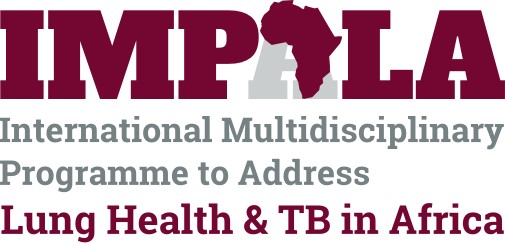
Non-communicable lung diseases, tuberculosis (TB), and acute presentations of lung disease, account for 3 of the top 5 causes of death worldwide, disproportionately affecting the world's poorest people. The co-existing burdens of communicable and non-communicable lung disease bring special challenges to health systems adapting to epidemiological and socioeconomic transitions in low and middle-income countries (LMICs).
The International Multi-disciplinary Programme to Address Lung Health and TB in Africa (IMPALA) is a four-year programme funded by the National Institute of Health Research (NIHR) and will generate new scientific knowledge and implementable solutions through multi-disciplinary collaborative work involving clinical, social, health systems, health economics and implementation scientists from Africa and the UK. Embedded within IMPALA, the multi-disciplinary capacity development research project MUDI will study and evaluate the integrated multi-disciplinary research and approaches of the IMPALA programme. MUDI will collaborate with researchers based in Ghana, Cameroon, Malawi, South Africa, Tanzania, Uganda, Kenya, Ethiopia, Nigeria and Sudan.
Centre for Capacity Research Objectives
Although multi-disciplinary research is essential for achieving the Sustainable Development Goals, there is very little robust evidence to guide the design of multi-disciplinary projects. Working with the participating African centres, the Centre for Capacity Research researchers will:
- Identify enablers and barriers to performing multi-disciplinary implementation research
- Identify the commonalities and differences in multi-disciplinary implementation research amongst the IMPALA projects
- Develop evidence-based case studies based on the IMPALAmulti-disciplinary research projects, and present transferable, cross-cutting recommendations
- Real-time sharing of emerging lessons within and beyond IMPALAto strengthen and promote sustainable multi-disciplinary implementation research within LMICs, and develop a benchmark for future research consortiums
By conducting a scoping review of literature to identify lessons and examples of good practice in multi-disciplinary research, consultations within and beyond IMPALA will enable the Centre for Capacity Research researchers to develop evidence-informed tools for data collection. Taking post-doctoral led projects within IMPALA as case studies, will enable the Centre for Capacity Research to generate prospective and on-going data to produce evidence-based recommendations and metrics to measure effective and sustainable multi-disciplinary research in LMICs; which in turn, can further be used as a benchmark for future multi-disciplinary research programmes.

